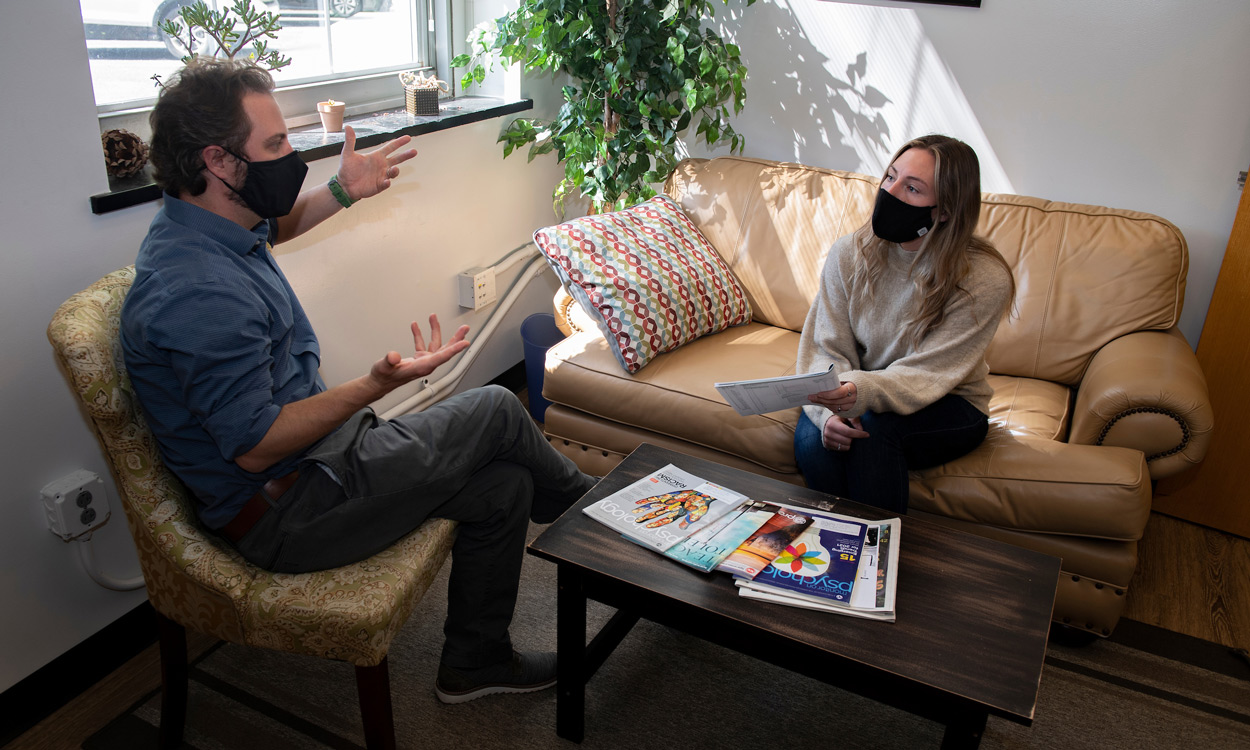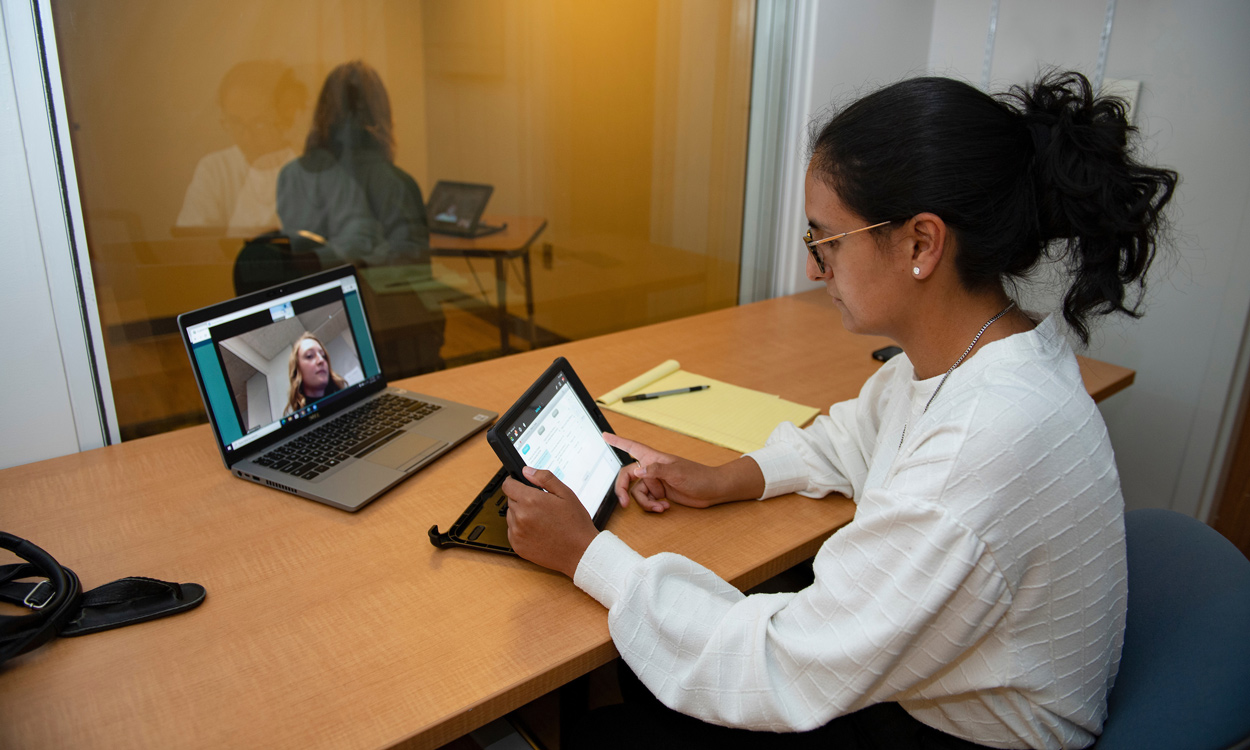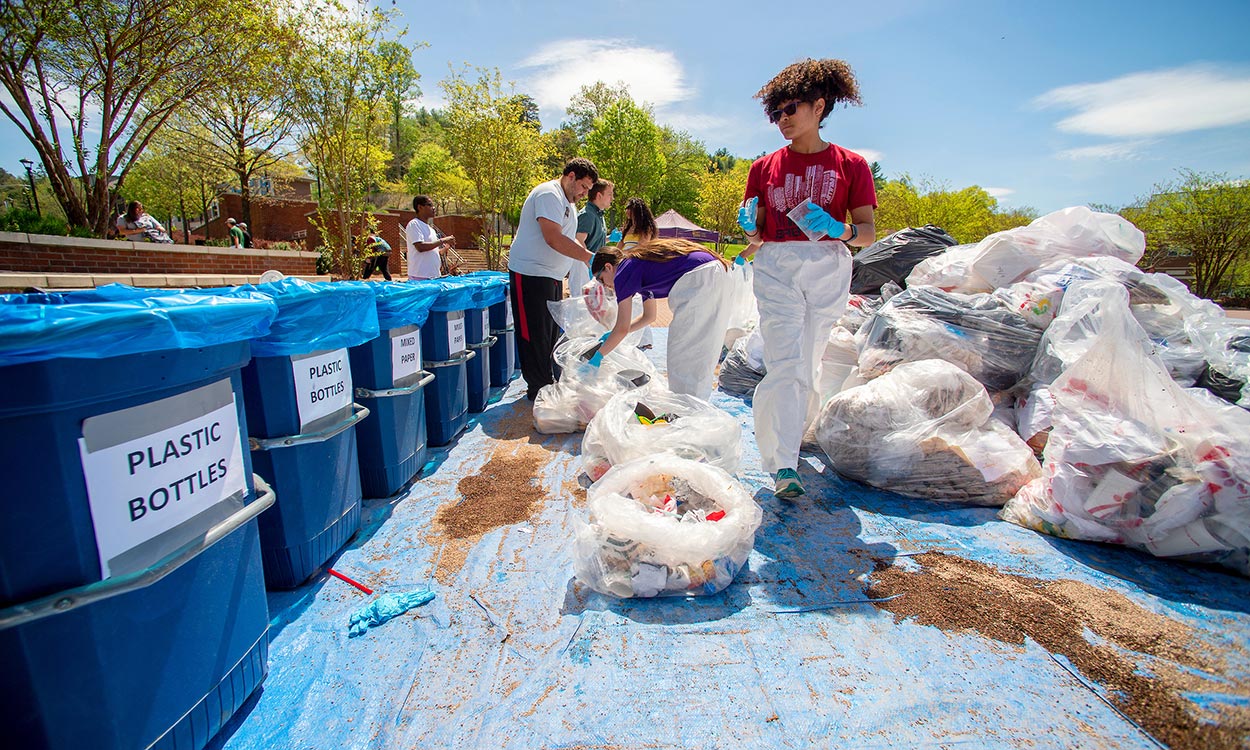McKee Clinic adapts quickly to pandemic restrictions to keep students, clients on track
When Western Carolina University associate professor of psychology Nathan Roth became director of the McKee Assessment and Psychological Services Clinic in 2015, little did he know his vision for the facility would be its saving grace five years later when a novel coronavirus reared its ugly head and put life on hold.
The clinic was already equipped with one- and two-way mirror rooms, which Roth planned to use for instruction of graduate students in conducting psychological and educational assessments. He added a video component so faculty supervisors could watch the assessments and provide feedback, thus laying the groundwork for establishing the clinic as a vital training ground for WCU graduate psychology students and, as such, an invaluable asset to Western North Carolina.
“One of the big pushes when I came on was to do high-quality supervision, meaning we watch these assessments, as faculty, and provide feedback,” Roth said. “We incorporated a video system into all the rooms so the students and faculty could go back and review. It’s a way for us to check scoring, to check the interview to make sure we don’t miss anything. It really ensures that our services are done right. And when they’re not, because we are a training clinic, we have a variety of assessments at our disposal and can make modifications. This allows us to know that what we’re putting out there is the best, and ultimately provides helpful recommendations for our clients.”
Typically for an assessment, a student and client would be in the same room, with a supervisor in another, Roth said. But when COVID-19 hit, he was forced to rethink how his students could continue their clinical work and the clients could continue accessing services. The clinic provides comprehensive psychological evaluations, educational and therapeutic recommendations, and consultation services to charter schools and the Catamount School, parents, students and individuals in WNC from 5 to 75 years old. All services are provided by master and doctoral-level graduate students under the strict oversight of university faculty.
“We train psychologists,” said Roth, who earned his master’s degree in clinical psychology from WCU in 2005 and has been a licensed psychologist in WNC for more than 10 years. “One of the core components of our program has always been assessment. Our students receive training in evidenced-based intervention and therapy as well as in other psychological services, but the primary piece that separates us from other programs is our focus on psychological evaluation, which informs therapeutic and academic interventions.”

When the clinic was forced to suspend its face-to-face meetings last spring because of the pandemic, Roth spent the summer recreating the policies and procedures manual, which he had just written a few years earlier, to accommodate the new coronavirus-related restrictions. The biggest modification, Roth said, was moving in-person assessments to tele-assessment, where students would still meet their clients at the clinic but conduct the assessments over a HIPAA-compliant Zoom link in separate rooms, some connected by a two-way glass and others by a one-way mirror. The clients can see the students conducting sessions, but they interact through the Zoom link on their iPads.
“You’re talking about administering different assessments, cognitive, academic, social emotional, where you have to be in the room with the client, one-on-one with no distractions. You can’t do it with masks on. People can’t understand each other and it is a legitimate barrier,” he said. “Our primary goal is keeping our students and the community safe, while continuing to provide services that are so needed in this area.”
Roth credits Kim Winter, dean of the College of Education and Allied Professions, Dale Carpenter, former dean and professor, and Alvin Malesky, head of the psychology department, with seeing the clinic’s potential by creating his position. He also credits his colleagues in the clinical and school psychology program for paving the way for the clinic. “They continue to support me and are committed to the clinic and the services we provide,” Roth said.
How have the graduate students adapted? “It’s been a real test of our flexibility and how quickly we can adjust to new things,” said Vanesa Salazar, a second-year master’s degree student from New Jersey in the school psychology program and the assistant clinic director. “Our entire first year we were getting prepped to do assessments the traditional way. Then, coming into the fall we had to quickly learn a new, pretty complicated way of how to assess these kids. It’s really been a good way for us to strengthen our flexibility and learn new ways to do things that still allow us to help these kids.”
Salazar, who speaks Spanish, says all the hard work required to keep the clinic open this year has been worth it for her and her clients. “Just this semester I got a client whose mom is Spanish speaking. I don’t think she speaks much English at all. It felt really great to be able to be in that position to help that mom and to be able to talk to her and let her know that her concerns are acknowledged and understood by someone who speaks her language.”
For Ashley Addonisio, who is in her first year of the psychology doctoral program, learning to tele-assess a client was challenging, but she’s grateful for the experience and for the chance to continue working on her clinical hours. “We’re just very fortunate, because a lot of clinics in the United States are not open, so students are not getting that experience, and we need a certain amount of hours to apply for internships.
“Wanting to be a clinical psychologist, in general you have to be flexible, so I think we were at an advantage with that. But it was really daunting when they told us we were coming back into the clinic and we were going to be doing these new assessments through tele-assessment. But I think we all came in with an open mind,” said Addonisio, a New York native, who graduated from WCU in 2020 with a master’s degree in clinical psychology. “I know I was excited.”
Haley Goller graduated from WCU with her master’s degree in psychology in 2019 and is in her first year of the doctoral program. The Naples, Florida, native plans to be a clinical psychologist. “I’m very grateful to have had this experience and to be able to say that I was a part of this change. We had the opportunity to work through it and I think it is going to benefit all of us moving forward in our careers even if it’s just having the ability to change and adjust when things are not the way they should be, and still be able to provide really good services,” she said.
Goller appreciates the unexpected benefits of what tele-health has brought to her clients and expects some of the benefits to remain, even when the COVID-19 restrictions are lifted. “I think we were able to reach people we weren’t able to reach before, or maybe it was a little easier on our clients in some way. We don’t require our clients to come into the clinic for every session right now. They only need to come in for testing sessions, which is a change from what it was before. People are having to take off less work and parents are very grateful they’re not suddenly having to find child care for all of their other kids,” she said. “Some of these things might stay, with the notion that we can do an intake session via Zoom and not lose a lot of quality.”
Roth agrees. “I certainly think there are pieces of tele-health that we will continue to use, like the intake sessions and potentially the feedback sessions, because we have families who travel from far away. We would still do all that testing in-house. It will allow us to accommodate our clients better in the future.”
Typically, the clinic sees about 100 clients a year, Roth said. But this year that number will be closer to 75, “which is a major accomplishment” because of the new modifications designed to keep everyone safe, he said. Normally, one client and one student would use one room, but now it takes three rooms, one each for the client, a student and a training partner.
Roth said tele-assessment is “very demanding” on the students and faculty, and he’s grateful for their commitment to keeping the clinic open. “To learn how to assess the standard way and then have to make these modifications just takes a lot of work and practice,” he said. “These students and these faculty work tirelessly to make sure they’re prepared to administer tele-assessment. So, without that hard work, this doesn’t happen.”
For more information, contact the clinic at 828-227-2473 or wcumckeeclinic@wcu.edu.


